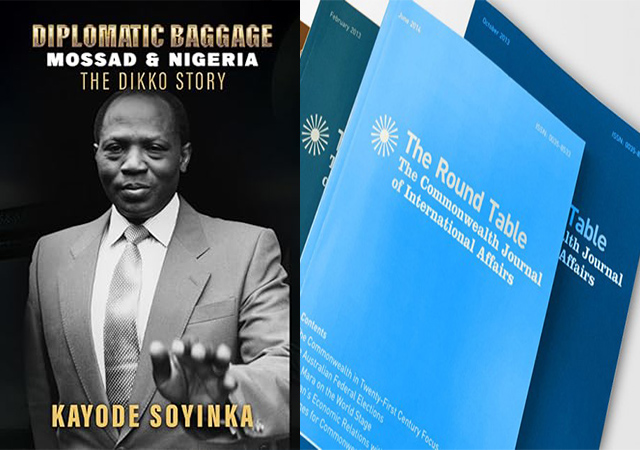
[This is an excerpt from an article in The Round Table: The Commonwealth Journal of International Affairs.]
Diplomatic Baggage, Mossad & Nigeria: The Dikko Story, revised and published in 2023 by renowned Nigerian journalist Kayode Soyinka, is a compelling account that revisits the dramatic abduction of Umaru Dikko in the United Kingdom. Dikko, a former Nigerian Minister of Transport, found himself in exile in the United Kingdom after fleeing the military regime that overthrew Nigeria’s democratically elected government of Shehu Shagari. As a matter of interest, the abduction actually occurred near Kensington Palace, the official residence of the then Prince Charles, adding a layer of geopolitical intrigue to an already sensational story.
The book, originally published in 1994, has been expanded with significant new content that makes it even more relevant today. The opening chapter, ‘Background to Madness’, sets the stage by delving into Nigeria’s complex and turbulent history. Soyinka argues that Nigeria’s instability is rooted in its very creation, with its name coined by Flora Shaw, the wife of Sir Frederick Lugard, the first Governor of Nigeria. This foreign invention, combined with a lack of cultural homogeneity, sowed the seeds of Nigeria’s ongoing conflicts and military coups. This chapter provides a foundational understanding of why Nigeria struggled to become a beacon of hope and inspiration for Africa and the rest of the black world.
Dispatches from the bleeding edge: memoirs by two outstanding international journalists during an era of disruption
UK’s Exit from the EU: Consequences for Africa and the Commonwealth
Chapters 2 and 3, titled ‘What? A Coup?’ and ‘We’ve Got You’, respectively, details the intricate planning and execution of Dikko’s abduction. These chapters elucidate the meticulous coordination between Nigeria’s military government and foreign operatives, capturing the high stakes and tense atmosphere surrounding the operation beginning from where he was grabbed by real force and hauled into a van with a cruising noise. He was so sedated that he may not have survived the flight from London to Lagos. The narrative is gripping, showcasing Soyinka’s prowess in blending detailed reportage with engaging storytelling.
The revised edition’s standout addition is Chapter 16, ‘The Homecoming’, which chronicles Dikko’s return to Nigeria and the country’s transition to democracy on 29 May 1999, after over 30 years of military rule. This chapter offers a reflective look at Nigeria’s journey towards democratic governance and the personal vindication of Dikko. The new military regime headed by General Sani Abacha in a measure of the total bankruptcy invited to join the Constitutional Conference many of the erstwhile politicians and ministers in the same Shagari civilian administration like Dikko. The return may have been timed to divert attention from the detention of MKO Abiola the assumed winner of the 12 June 1993 elections. Another new chapter, Chapter 4, ‘David Marrow: The Customs Officer Who Saved Dikko’s Life’, had earlier introduced the heroic role of a suspicious customs officer who prevented Dikko from being smuggled out of the UK in a crate. This anecdote adds a human element to the narrative, highlighting the unexpected heroes in geopolitical dramas.
Chapter 5, ‘Diplomatic Stand-off’, features the perspective of General Anthony Hannaniya, Nigeria’s former High Commissioner to the UK. His account 38 years after and though his own memoir, All Eyes on Me, provides insider insights into the diplomatic tensions that arose between Nigeria and the UK in the wake of the abduction attempt. Chapters 6 and 7, ‘MI5’s Pressure on Dikko’ and ‘The Israeli/Mossad-NSO Connection’, reveal the covert operations and intelligence manoeuvres by the UK and Israeli security agencies. These chapters underscore the complex interplay of international espionage and statecraft, offering a nuanced understanding of the geopolitical stakes involved.
Further enriching the narrative, Chapter 7 discusses the internal dynamics within Nigeria’s External Affairs Ministry, particularly the transfer of its research department to the Nigerian Security Organisation, which then functioned as its external intelligence arm. This reorganisation led to significant conflicts of interest and operational challenges within the ministry.
Chapter 8, ‘The Fougerolle Affair’, delves into the corrupt practices of money politics in Nigeria, contextualising the military’s pursuit of ousted political leaders. The subsequent chapters, ‘The Battle for Political Asylum’, ‘Akinloye & Co., Life in Exile’, and ‘The Battle for Extradition’, detail the struggles of exiled Nigerian leaders as they sought political asylum in the UK, fought extradition, and coped with life in exile. These chapters provide a poignant look at the personal and political ramifications of displacement and persecution.
Steve Itugbu is with the School of Oriental and African Studies, University of London.
Diplomatic baggage: Mossad & Nigeria: the Dikko story by Kayode Soyinka, London, Higher Ground Publishers, 2023, revised, updated and reprinted edition of book first published in Nigeria in 1994.



